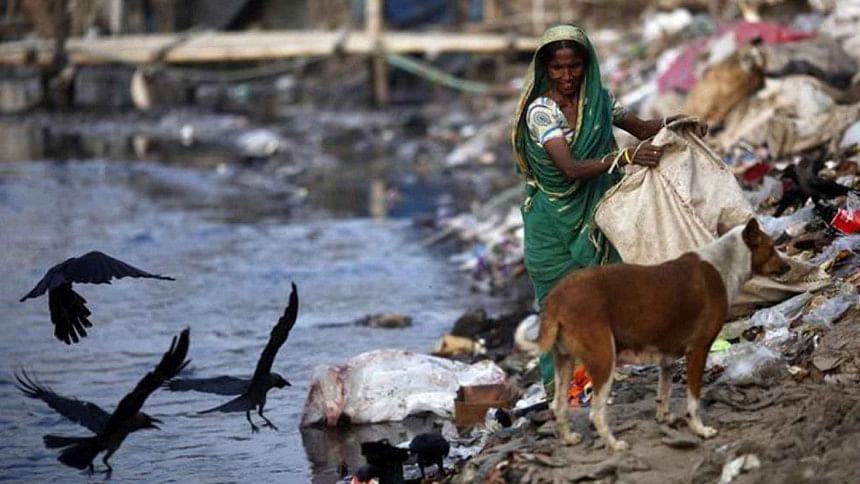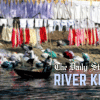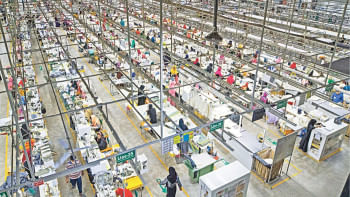Saving our ‘One Earth’ before it’s too late

The global community is preparing to celebrate the 50th World Environment Day today. As world leaders supposedly emphasise sustainable development, putting effort into finding feasible solutions to combat climate change before its worst effects are realised irreversibly, making countless promises for a sustainable future for all, it's important to take a look around, understand what's happening around us, and ask ourselves, "Are we actually on the right track to protect our One Earth?".
Let's take a step back from the global climate crisis and anthropocentric destruction of the Earth's life systems. Let's talk about the simple things. Water and Air. These are things that we need to survive. Yet we emerge today in an outrageous situation where many across the globe are denied these fundamental human rights. According to the World Health Organization, globally over 2 billion people live in countries that are water stressed and at least 2 billion people drink polluted and contaminated water. Around 99 percent of the entire world's population breathes air that exceeds WHO's air quality standards. This is a global public health crisis. According to water.org, in Bangladesh, more than 1.8 million people do not have access to safe drinking water. The State of Global Air-2020: How Does Air Pollution Affect Life Expectancy around the World report by the Health Effects Institute states that, the life expectancy loss in Bangladesh is 2.91 years. A life without access to clean air and clean water is a life deprived of dignity. As Bangladesh is scheduled to officially graduate from LDC status in 2026, without having access to clean air and clean water, this development rings empty when it doesn't bring significant positive change in the lives of the most marginalised.
Bangladesh has over 700 rivers and they provide the lifeblood for this country. On February 3, 2019, the High Court of Bangladesh issued a landmark decision declaring rivers to be legal entities with rights and appointing the National River Protection Commission (NRPC) as their legal custodian. Regardless of the decision, powerful industries have continued grabbing and polluting the rivers, disrupting their natural flow and destroying their biodiversity. According to Transparency International Bangladesh, 23 percent of wetlands in Dhaka and its surrounding areas were lost between 2010 and 2019. Grabbing and polluting the rivers would impact the vulnerability of the already vulnerable river dependent communities and traditional livelihoods such as fishing. In a country where 60 percent of people have their only animal protein intake from fish, this has every possibility to affect Bangladesh's food security.
Rivers are not the only water bodies that are facing the repercussions of environmental degradation. According to the Ocean Conservation Trust, 50 percent of life-giving oxygen comes from the ocean. We have a huge amount of carbon reserved in the oceans. Ocean's plants absorb carbon dioxide and release oxygen in the atmosphere. This phenomenon shows how important of a role the ocean plays to maintain balance in our atmosphere. However, by polluting the oceans and the seas, we are only lowering their capacity to absorb carbon dioxide and release oxygen. Cox's Bazar, the world's largest sea beach has a tremendous pollution problem due to single use plastic at the hands of tourists. St Martin's Island, the only coral island in Bangladesh, is experiencing an increase in pollution with the rise of unchecked tourism. The region has also been touted as a future energy hub with large scale megaprojects such as the coal powered thermal power plants in Matarbari. Countless numbers of species, both underwater and on land, face risks due to habitat loss and ecosystem destruction.
The Sundarbans, the world's largest mangrove forest, has protected our country from catastrophic natural disasters. But the construction of Rampal Power Plant has put the future of the Sundarbans at stake where the power plant's discharge of pollutants would significantly hamper the ecosystem of the forest. This would be detrimental to the biodiversity, air quality, water quality, health of the plants, and livelihood of the local communities. Globally, the situation of the forests is not very hopeful either. According to IUCN's Issues Brief which was last reviewed in February 2021, more than half of the world's tropical forests have been destroyed since the 1960s, and every second, more than one hectare of tropical forest is destroyed or severely degraded. Many species are threatened by forest degradation and loss. This reduces the forests' ability to provide essential services such as acting as important carbon sinks. Deforestation and forest degradation have an impact on the lives of 1.6 billion people who rely on forests for their livelihoods. One billion of them are among the poorest people on the planet.
With everything that's happening around the world and in our own country—destruction of lands, pollution of water bodies, exploitation of resources, suffering of the most marginalised people—it's not easy to stay hopeful. It's normal to be concerned about the future of the world, not just for us, but for our next generations. But as demoralising as all the phenomena mentioned above might be, giving up is not an option. It is up to the people to hold their representatives accountable for their lack of response to environmental degradation, and to hold the rich and powerful corporations accountable for destroying our natural resources. We as individuals can move away from single use plastic, waste less food, use less energy, but we must act now to change the systems that profit off the destruction of our earth. There is no second planet for us. This is our only home, and we must save it, before time runs out.
Syeda Rizwana Hasan is a supreme court lawyer and the chief executive of Bangladesh Environmental Lawyers Association (BELA).

 For all latest news, follow The Daily Star's Google News channel.
For all latest news, follow The Daily Star's Google News channel. 








Comments